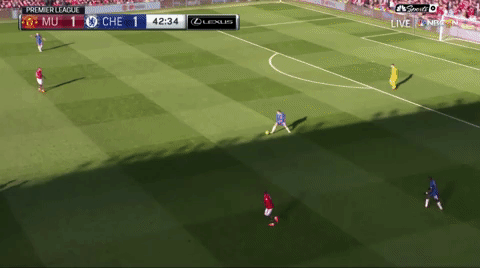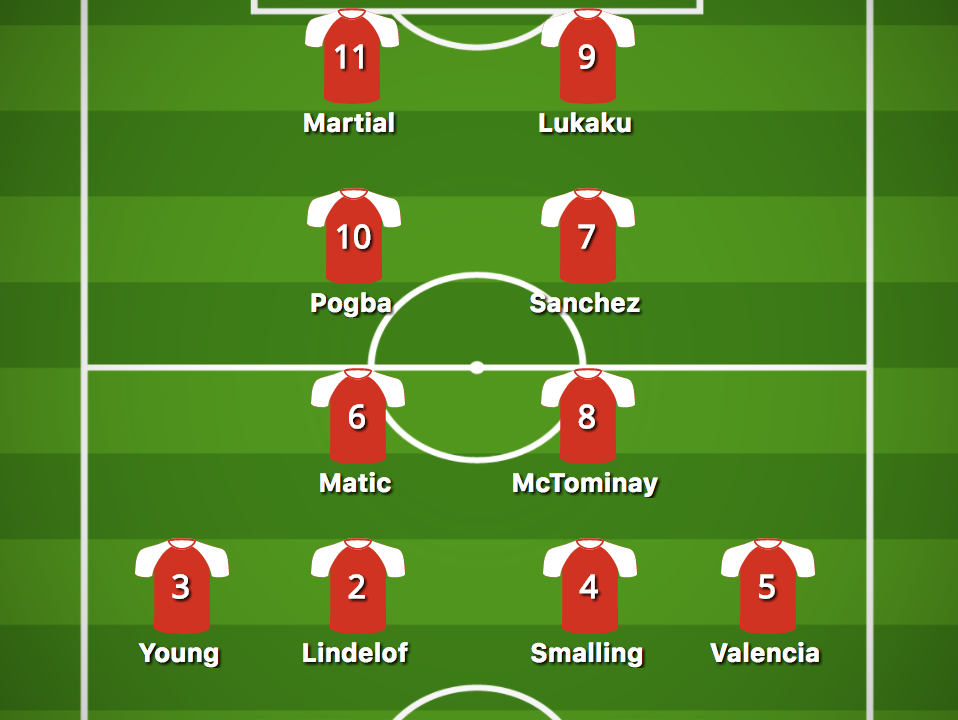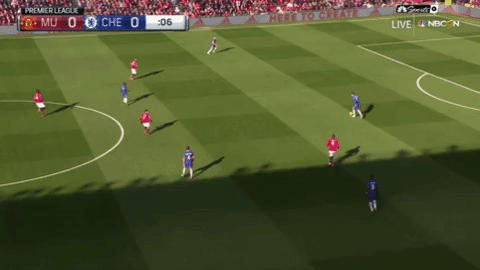2017-18 Premier League DARTS, Week 28: Jose Mourinho got lucky

Welcome to Premier League DARTS, FC Yahoo‘s weekly EPL column that will run every Monday morning. Why “DARTS”? Because Henry Bushnell will recap the weekend’s biggest games with Discussion, Analysis, Reactions, Takeaways and Superlatives. All of that is below. But first, a brief intro …
Soccer, you’ve probably heard, is a game of fine margins. What you might not realize is just how thoroughly the cliché applies.
It builds on itself. A clipped crossbar here, a miscue there turn victory into defeat. Defeat – as Chelsea Football Club knows all too well – shapes months of narrative to come. On Sunday, these few inches at the Theatre of Dreams definitively flipped the Premier League’s top-four race. At around 2:40 local time on Sunday, it was a jumbled mess. An hour later …
Six points don’t seem mountainous. On the surface, the gap between Chelsea and Manchester United isn’t daunting. And, of course, the Blues don’t have to make it up; they merely have to jump one of the three teams above them. But United, per FiveThirtyEight, is the weakest of those three teams. And what would Chelsea have to do to catch the Red Devils?
Well, if United continues apace, Chelsea would have to win nine of its last 10 games. No biggie.
Put another way, if Chelsea continues apace, United would have to take 12 or fewer points from its last 10 games to dip below Antonio Conte’s side. That’s a record of 4-0-6; or 3-3-4; or 2-6-2. Can you really imagine Manchester United winning just three games against a slate that includes West Brom, Swansea, Crystal Palace, West Ham, Brighton, Bournemouth and Watford?
That last paragraph shows just how gigantic Sunday’s 2-1 United victory at Old Trafford was, and just how critical a few moments that contributed to it were. Because the result could have been much different. And frankly, Jose Mourinho is lucky it wasn’t.
1. Man United’s slipshod first-half press
Mourinho was lucky, because in the first half, United seemed clueless. The Expected Goals tally after 45 minutes was roughly 1.8-0.6 in favor of the visitors. The hosts spent much of the half searching for answers and coming up empty, apart from Romelu Lukaku’s goal.
Their problems stemmed from the opening phase of Chelsea’s attack. They couldn’t sort out the first two lines of their press. At times, they allowed Andreas Christensen or Antonio Rudiger to carry the ball forward unimpeded. When they tried to address that particular issue, they left other space open – acres of it:

This is simple stuff. It really is. Alexis Sanchez leaves his man to close down the ball. With two low-difficulty passes, the Blues have found that man, and boom, they’re off toward goal.
It wasn’t always that easy for Chelsea. There wasn’t always that much space in midfield. But there was a lot of it. United’s front six looked lost. And the reason for that wasn’t merely big-game jitters.
2. Mourinho’s new “midfield square”
The reason was Mourinho, and an astounding decision, presumably made last week, to pilot a new formation in one of the biggest games of his 20 months at Old Trafford. It wasn’t just a tactical tweak, a man-marking assignment and subsequent adjustments – though those were part of it. It was a new configuration, and one you rarely see at the highest levels of European football.
Mourinho called it a “midfield square,” but we can come up with a better name. How about the “top hat”? Or the “skyscraper”? Anyway, it was a 4-2-2-2, but not the traditional 4-2-2-2 with the second line of two wider than the rest. It was more vertical than that:

The unforeseen formation switch perhaps shouldn’t have been so off-putting. After all, it was in the same fixture last season that Mourinho stuck Ander Herrera to Eden Hazard, almost as literally as can be. Both gameplans underscored his reactive identity. Matchups with Conte seem to amplify it.
But whereas the Herrera ploy worked brilliantly, this one didn’t, largely because his players seemingly had no idea how to execute it. Scott McTominay was cast in the Herrera role this time around, following Hazard back to front and only passing off responsibility if the Belgian drifted across the field. Nemanja Matic was often tasked with Willian as a result, so United’s front four were playing four-on-five in the Chelsea half of the midfield third:

That in itself isn’t a problem. Only the most aggressive press doesn’t face this kind of numerical disadvantage high up the field. The problems were the timing and configuration of United’s.
Warning signs were present literally seconds into the game. Sanchez, rather than waiting for a cue or trigger, charged at Christensen. His angle was poor. And with plenty of time to make a decision, Christensen broke the press with a pass that you or I could have made:

Many of the breakdowns were individual mistakes. “It took us some time to adapt to [the new system],” Mourinho explained postgame. But the difficulties ultimately came back to him, and his risky decision to ask players to carry out unfamiliar tasks under extreme pressure. That’s why he trudged back to the dressing room fortunate to be level, and with a lot of work to do.
3. United’s second-half improvement
The first press of the second half was markedly different than the one Christensen bypassed an hour earlier. Mourinho had clearly done some halftime tutoring. This time, one of the forwards closed Christensen, leaving the cross-field pass from center back to center back open. While that pass was en route, Sanchez flew at Rudiger:

“The players in the midfield square took a bit of time to find the right timings to press,” Mourinho said afterward. After halftime, they were better, initiating pressure when the ball was in flight rather than at a Chelsea defender’s foot. The “how” mattered less than the “when.” Sanchez could leave Drinkwater to go at Christensen, as long as he went as the Danish defender prepared to receive the ball facing his own goal.
So United had eliminated the silly mistakes. That effectively neutralized the game. What swung it in the Red Devils’ favor was Hazard’s fatigue.
Conte hinted at it in his postmatch news conference. The Belgian playmaker was all over the field in the first half, and was the reason United couldn’t press more aggressively. In the second, United could, because Hazard was far less active. He wasn’t drawing defenders out of position; he wasn’t as dangerous on the ball; he didn’t command as much attention. At one point, he even swapped positions with Morata, and was eventually substituted. Two minutes later, Jesse Lingard won the game.
4. So is the “top hat” here to stay?
With some alterations, it just might be. Or at least it will be an option. It suits Pogba better than anything else Mourinho has rolled out. Sanchez didn’t look comfortable in his attacking midfield role, but could be afforded less defensive responsibility against inferior opponents. Or he could be thrown up top alongside Lukaku, as he was for the final 25 minutes Sunday, with Lingard alongside Pogba underneath. And while McTominay was competent, his spot should eventually be Herrera’s.
Plus, with no Hazard-like talisman to track, ideally the midfield will be more flexible in future iterations. It can easily morph into a diamond – like the one Mourinho used on the way to a Champions League title with Porto in 2004.

There will be kinks to work out, and other managers will have counters. But there’s both logic and potential here.
5. Diving Dele
Just minutes before United and Chelsea kicked off in Manchester, Harry Kane heaped pressure on both of them with another late winner. But Spurs labored through their contest at Crystal Palace. They were sloppy and wasteful.
Oh, and they were unlucky, because Dele Alli quite clearly should have won a penalty in the second half when he was hacked down by Patrick van Aanholt:

Why didn’t he get the call? You don’t need to be a genius to connect the dots. The 21-year-old gets accused of diving every week now. He took another premature tumble later in the Palace match. He’s developed a reputation. That reputation stands in between him and the benefit of the doubt.
Because it seems to have been taken down AGAIN… heres Dele Alli’s shameful dive earlier on! I know it wasn’t given, but surely he’s got to be punished for persistent diving? It’s every game now! pic.twitter.com/051pVOYAi9
— Realistic Irons (@RealisticIrons) February 25, 2018
Mauricio Pochettino thinks it’s “unfair.” And he’s probably right. But perhaps this is an example of how diving can police itself. It’s a hugely beneficial tactic; in fact players should probably dive more often. Retrospective bans aren’t going to stop them from doing so. The only thing that might be able to is silent whistles – when there isn’t contact, but also when there is.
That, though, takes us into murky waters. A player’s reputation isn’t solely based on the number of times he dives; a lot of it has to do with high-profile incidents, backlash and media coverage. And that’s where reputations could be branded “unfair” – or at least overblown.
6. The misadventures of Serge Aurier
We mentioned Spurs’ sloppiness … how about the day Serge Aurier had at Selhurst Park? Not one, not two, but THREE foul throw-ins!
The MiB Show Returns Tonight at 6 p.m. ET on @NBCSN. Up in your Monday like a foul throw in from alleged professional footballer Serge Aurier. Except not as funny. @NBCSports @NBCSportsSoccer pic.twitter.com/aEkyLajqAL
— Men in Blazers (@MenInBlazers) February 26, 2018
It was so bad that Kane didn’t feel comfortable risking a fourth:


